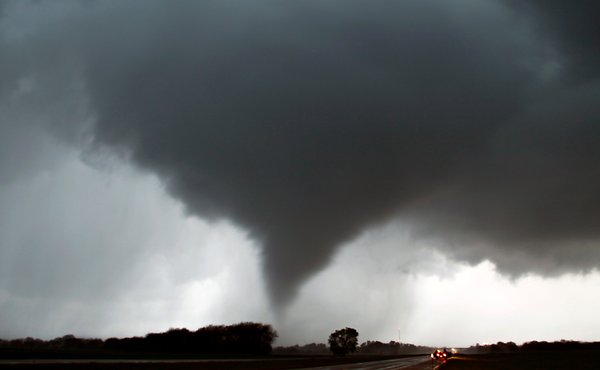Kansas, Oklahoma, Earth Day, 2012, or Eaarth Day, cognizant of Bill McKibben’s observation that the planet on which we live is qualitatively different from the planet on which we were born.
Do you see your cup as half-full, or half-empty? Is it on a table, or a pile of rubble? And is it filled with clean water or a toxic soup?
Status: Over 100 Tornadoes hit the mid-west, mostly Kansas and Oklahoma on Saturday, April 14, 2011 (NY Times). The summer of 2011 was one of the hottest, with 90 days of over 100 degrees in Austin, Texas ( National Oceanographic and Atmospheric Administration, NOAA: Data, Analysis). The winter of 2011-2012 was also one of the warmest, with records set and broken across the United States. A thorough analysis of climate science is beyond the scope of this post, but is covered in The Rough Guide to Climate Change, The Symptoms, The Science, The Solutions, by Robert Henson, ISBN 978-1-84836-579-7, Climate Change, A Multidisciplinary Approach, by William Burroughs, ISBN978-0-521-69033-1, The Climate Fix, by Roger Pielke, Jr, ISBN 978-0-465-02519-0, and An Inconvenient Truth, by Al Gore, ISBN 1-59486-567-1, Eaarth: Making Life on a Tough New Planet, by Bill McKibben, ISBN 978-080509056-7. These are available at your local bookstore, if you have one. Many Americans now understand that our weather and climate are effected by the amount of carbon we have pumped into our atmosphere in the last 200 years (NY Times). If you don’t want to understand the analysis, tune the tv to your local climate denier station, buy a gun, some ammo, and lots of food and water.
In 1986, 25 years ago, Gro Harlem Brundtland chaired the UN Commission that bears his name and wrote the report “Our Common Future.” In this report, here, Brundtland defined as “Sustainable,” Development which “meets the needs of the present without compromising the abilities of future generations to meet their needs.”. you and I are each one of over 7 Billion people living here on Eaarth. More than half of us live in Asia and Africa, and a billion of us eke out existence on the bottom of the pyramid. An unbiased observer would conclude we have not paid much attention.
Today, as 25 years ago, the people of North America and Europe have abundant food, clean water, and lots of stuff, while many in Asia and Africa are poor and hungry. The hundreds of millions of people in North America and Europe are – unquestionably – better off yet we too have issues. Rather than the problems of scarcity we have the problems associated with overabundance: we have too much food and many of us – one out of four – are fat. We use too much resources – we are using non-renewable resources and consuming renewable resources faster than they can be renewed, consuming, according to estimates, 1.25 earths.
On March 11, 2011, an earthquake triggered a tsunami that caused the cooling system to fail in three nuclear reactors at the Dai-ichi facility in Fukushima, Japan. The editors of Popular Logistics have observed that, in terms of its cozy relationship with regulators, the Japanese nuclear industry bears a striking resemblance to the American nuclear industry (here).
On Earth Day, 2010, an explosion at the Deepwater Horizon oil rig in the Gulf of Mexico was uncapped for 85 days, allowing approximately 5.1 million barrels of crude oil to gush from the wellhead into the gulf. (While the number may be staggering, the math is simple: 60,000 barrels a day multiplied by 85 days.) No one at BP, Halliburton or Transocean has been held accountable. BP has claimed that Halliburton destroyed evidence (here).
This occurred a shortly after an explosion at the Upper Big Branch mine in West Virginia killed 29 miners, April 5, 2010. Deaths in coal mines in China dropped from 4,746 in 2006 to 2,433 in 2010. ( SweetandSourSocialism.
Meanwhile,
- Bard is one of the latest colleges to offer an MBA in Managing for Sustainability. They started at the Bainbridge Institute in Washington and the Presidio in San Francisco, then, by 2008, spread to Marlboro College in Vermont. Marlboro only offers an MBA in Managing for Sustainability, Ralph Meima, Beverly Winterscheid, John Ehrenfeld, Cheryl Connor, and other faculty, staff and students understand that the only way to manage for the future is to manage for sustainability.
- The “Sustainable Cities” school of architecture, here, developed out of the Brundland Commission report.
- Ford Motor Company is committed to smaller, more efficient vehicles, adding the ‘Eco-Drive’ option to models across the spectrum (Ford Sustainability / Popular Logistics).
- GM is working on more efficient engines in Michigan (here / here), produced their first “Corporate Sustainability Report (here).
- GE and Siemens are building wind turbines,
- Solazyme is working on sustainable oil,
- Solar and Wind energy installers are adding more solar and wind energy to the grid.
To reiterate,
On Earth Day, do you see your cup as half-full, or half-empty? Is it on a table, or a pile of rubble? And is it filled with clean water or a toxic soup? What can you do about it? What should society do about it?
–
Popular Logistics Earth Day Posts
